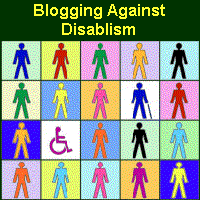I’m persuaded that the late 19th and early 20th century love affair with eugenics continues to inform our understanding of disability. If the unfit are slated for elimination, it becomes very important to draw a clear line between them and us, and put “us” firmly on the proper side. The recent return-to-fashion, via pre-natal screening and consequent abortion of undesirables, hasn’t helped.
What I see is a fictional polarization, in which the culture cuts a medical boundary between them and us. On the one side, people who are Disabled, on the other, everyone else. It is a fanciful line, that has little regard for actual abilities, or happiness, or life expectancy. Oh sure, if you’re significantly paralyzed, that makes you Disabled. But say you have a hand that doesn’t work quite right, or is missing parts? Does that make you Disabled? Or just sorta decrepit? Discrimination is in the eye of the beholder.
It would all be a silly parlor game if the stakes weren’t so high.
But they are high, because there’s an all-or-nothing mentality out there. I stumbled the other day on an internet conversation about faking disability. One accusation: If you see someone in the store using a wheelchair or scooter, and that person is actually able to stand and even walk, they must be faking. (Because, you know, they’d totally want to show their hand right there in front of you. It was all a great game until the Cheetos were out of reach.) No comprehension that someone might be able to walk a little bit. Inconceivable.
The US disability benefits system is a bit like those combox warriors, only clucking over who can work and who can’t. There is cash at stake, and people do fake in order to grab at it. But still, the can-she-or-can’t-she thinking permeates the system. There is little recognition that many disabilities may limit, but not eliminate, the ability to work. That one may need assistance only intermittently; or assistance to compensate for lower wages, higher expenses, or the ability to only work part-time.
But to me the most painful aspect of the polarization is the social aspect. The whispering and uncomfortable tones. The notion that in order to write or care about disability issues, you must somehow Be One of Them. There must be some Deep Reason you care about this arcane, specialized topic for weirdos; simple common sense is not enough. And furthermore, if you complain that this or that facility needs better acomodations, you must be one of those nutty bleeding-heart types.
–> After all, those people don’t _________, and anyway if they wanted to do, than they could __[insert ridiculous cumbersome workaround guaranteed to keep Those People away]_.
It’s dumb. It’s just dumb. So don’t play.
Rant over.
*****************************************************************
Thank you to Ruth for reminding me once again of the date and place for the annual BADD Blogfest. It is not too late contribute yourself, so have at it. Time-delay entries are accepted.


